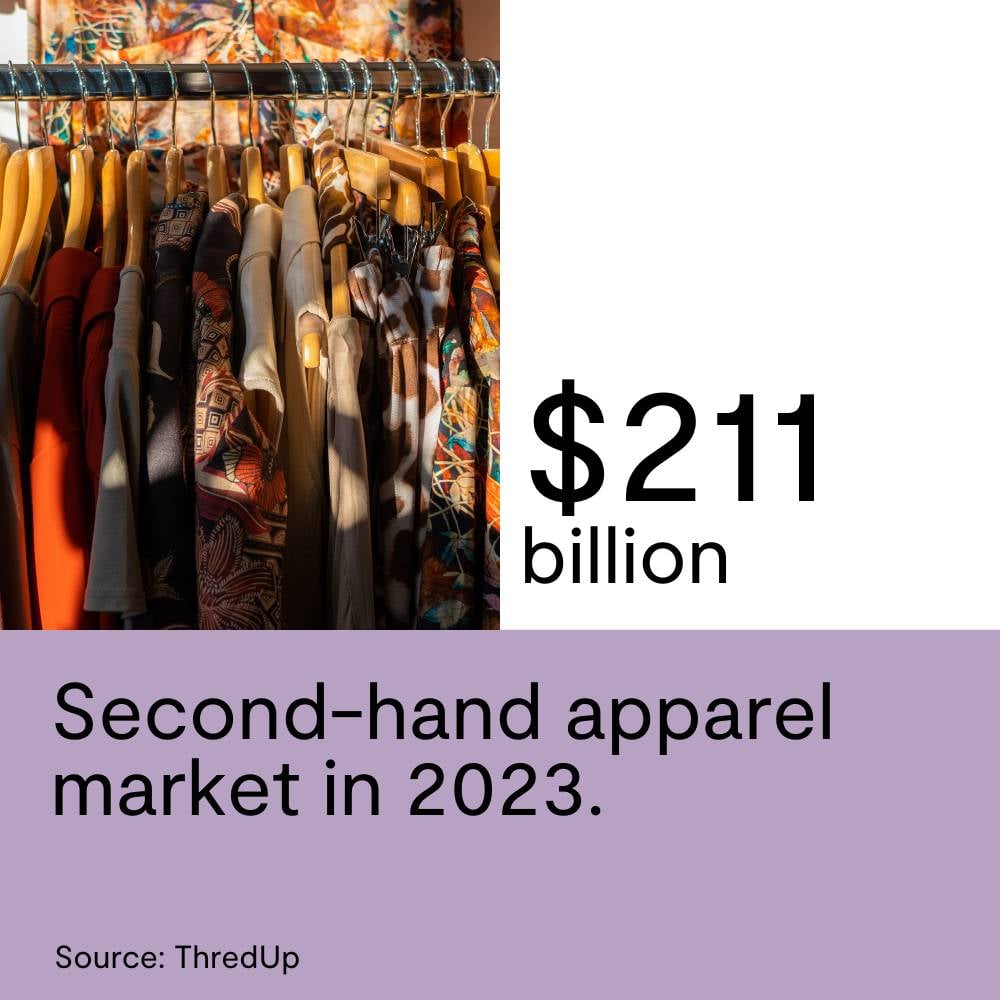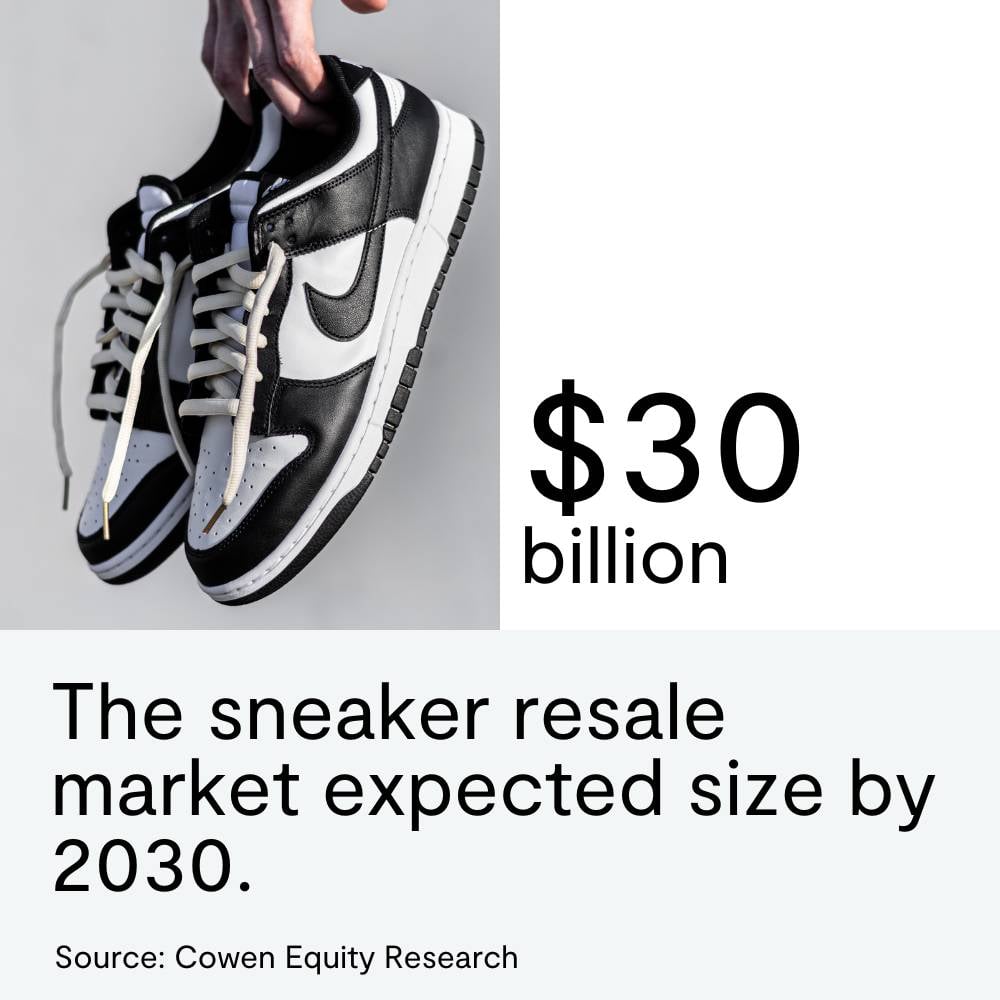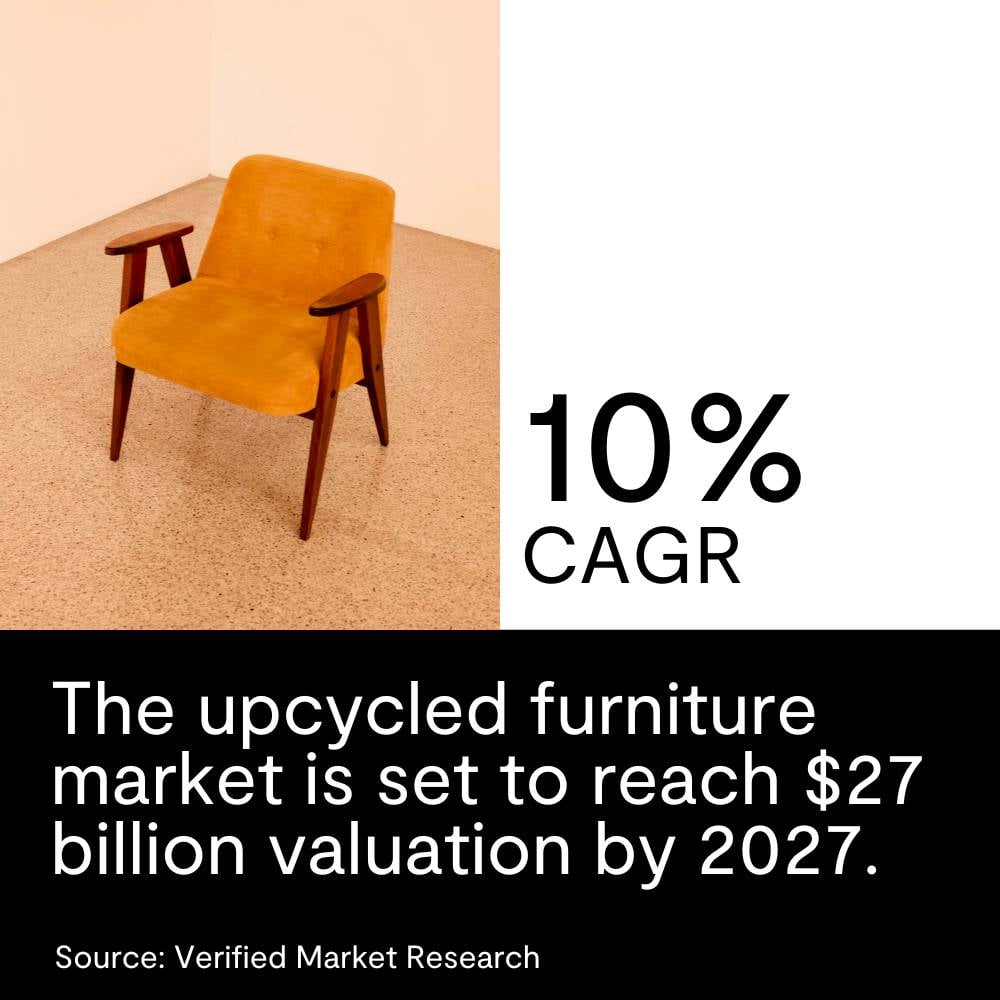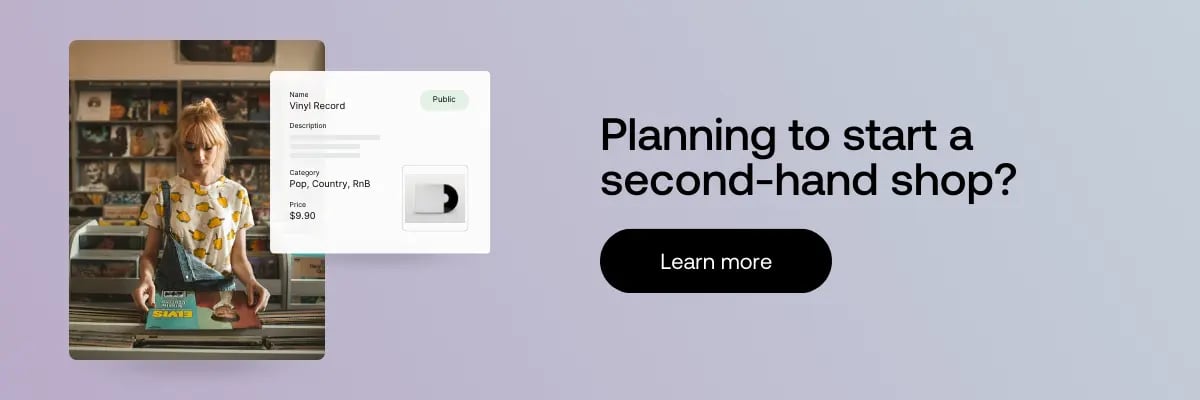If you want to run a successful resale business, you need to know the best items to resell for profit. The secondhand apparel market is booming as online and offline thrift stores offer customers quality goods at low prices.
However, while pre-loved fashion is grabbing the headlines, they're not the only option for businesses who want to resell goods.
This article will explore the best items to flip for profit. You’ll find a mix of products, both old and new, that can inspire your reselling venture.
1. Vintage clothing
The secondhand apparel market is worth over $200bn worldwide. Research suggests the figure will be more than $350bn by 2027.
You can sell vintage clothing online or in a brick-and-mortar business. If you have an eye for fashion, you can pick up items in yard sales, flea markets, or at your local thrift store. From there, with the right marketing, you can flip them online on eBay, Facebook marketplace, or online fashion sites like Etsy, Depop, or Vinted.
The benefit of selling vintage clothing is that the market is healthy and growing each year. However, there are some downsides, including finding a steady and consistent source of quality products and stiff competition from both big retailers and other individual resellers.

2. Handbags
The secondhand luxury handbag market is valued at $6.3bn, with research suggesting it will double in value in the next ten years.
The business involves sourcing pre-loved bags and, in some cases, restoring and fixing these items. Luxury bags tend to hold their price, but this strong demand can both work against you and in your favor.
Bargain luxury bags tend to be snapped up quickly, so you must stay vigilant to secure these potentially profitable deals online. Other issues involve authenticating each bag in an industry awash with convincing forgeries.
3. Shoes and sneakers
The secondhand shoe market is currently valued at $6 billion globally and is projected to reach $30 billion by 2030. The niche involves sourcing footwear in various conditions and selling it locally or online. Many footwear resellers also restore items, adding significant value to their inventory.
Profit margins for shoes and sneaker resale can be around 40%, with many platforms to connect you with potential customers.
However, one of the biggest challenges is getting your hands on stock at low prices and dealing with competition in a crowded space.

4. Watches
Research suggests the global second-hand watch market is worth around $1.3bn, with projected growth leading to a $2.2bn valuation by 2027. Millennials and Gen Z are significant drivers of this growth. Operating within this niche requires sourcing pre-loved watches at low prices and selling them online or offline.
Luxury watches fetch huge sums. When combined with repairs and restoration, luxury watch resale can produce big profit margins. However, inventory costs are high. Other challenges include verifying the provenance of items to resell, long sales processes, and competition from big-name watch retailers.
5. Jewelry
The US secondhand jewelry market is worth north of $500m, with estimates suggesting a valuation of $1.2bn by 2027. You can run a pre-loved jewelry store in a number of different ways, both online and offline. For example, many secondhand jewelry businesses are consignment stores, while others operate strictly online.
You need some knowledge about gold, silver, and stones to run a store. Verifying the legitimacy of these goods and setting appropriate pricing requires a lot of experience and even specialist equipment. The barrier to entry is fairly low, with inventory investment as little as $500 to $1000.
Consistently sourcing pieces at a low cost to drive a profit is challenging, and buying from abroad is risky and involves certification in the case of diamonds.
6. Wedding dresses
Secondhand and vintage wedding dresses have exploded in popularity in the last few years. The cost of living crisis means that demand for low-cost alternatives is skyrocketing. Between March 2020 and March 2022, Vestiaire Collective, a luxury resale website, saw a 527 percent increase in listings for wedding dresses compared to the previous two-year period.
While inflation has driven up the costs of weddings, brides are looking to save money in other ways. Sustainability is another reason why second-hand wedding dresses have become popular. Go to your nearest thrift store, and you'll be sure to find excellent wedding dresses at a fraction of their initial price.
Some of the challenges you'll need to contend with are slow sales cycles and the need to accommodate fittings and returns. Additionally, there are several apps that specialize in the space.
On the plus side, markups are decent, so you can make good returns when you find a dress to flip for profit.

7. Upcycled furniture
The upcycled furniture market has a compound annual growth rate of 10% and is set to reach a valuation of around $27bn by 2027. Therefore, selling used furniture makes a great side hustle or full-time business opportunity.
However, there are a few challenges you need to consider. Finding good quality wood furniture is the least of your problems. You can pick up great pieces to restore for free. However, transportation to your warehouse is expensive and time-consuming.
Storage space is another issue that could cause you to limit your inventory. If you have the skills, restoring the furniture can be relatively inexpensive. If you need to hire specialists, it will eat into your profit.
How to start selling used furniture for profit →

8. Handmade crafts
The handicrafts market size has a CAGR of 11% and is expected to hit almost $1.4bn by 2028. One of the most attractive aspects of these businesses is the low barrier to entry and wide availability of inventory. However, it's a competitive space, with lots of auction sites and resale apps already operating in the space.
Good market knowledge is essential for spotting items to resell. Handicraft inventory can be found at low prices and sold high with the right marketing.
9. Art and prints
The global art market is a behemoth. Estimates suggest it's worth around $67bn worldwide. Grabbing a slice of that pie can be extremely profitable. Pre-existing knowledge, an eye for the right piece, and networks are essential. You can source art from lots of places, like yard sales, estate sales, online auction sites, and private collectors.
Building up a trusting customer base is important, especially if you want to sell high-end art. Framing can add value to your business and lead to higher profit margins.
10. Antiques
Antiques are one of the most time-honored reselling businesses. Some estimates suggest the antique market size is around $2bn per annum. A deep knowledge of antiques is essential here, especially if you plan to source goods at yard sales and similar markets.
It's important to remember that the antique market is niche, and there is a lot of competition. However, if you can find a reliable source of inventory and stay on top of trends, it can be a very profitable reselling business.
11. Rugs
While there are few reliable statistics for the second-hand rug market, the overall market size is around $36bn globally, with a CAGR of around 4.5%. As Gen Z and Millenial's preferences shift towards used goods, the market will continue to grow.
Size, quality, materials, and brand are all factors that influence rug prices, which can run from as little as $50 to five figures. However, it's worth noting that handmade pieces hold their value far better than more generic alternatives.
Sourcing rugs at flea markets, estate sales, and thrift stores can provide you with inventory to sell online or in your own shop. Having an eye for a bargain and restoration skills can bump up the value of your inventory and lead to strong profit margins.
12. Home decor and accessories
The secondhand home decor and accessories market is worth around $30bn, a figure that looks set to almost double by 2030. These goods are some of the best items to flip online because of huge and never-ending demand. Some of the most popular items include mirrors, cabinets, vases, tables, and even wall prints.
Garage sales, estate sales, and even home clearouts are all great ways to find home decor and accessories. Some pieces hold their prices better than others, and trends move in and out of vogue. However, if you can predict which items you can flip for profit, home decor resale is a fast-moving business with decent profit margins.
13. Luxury items
The luxury goods resale market is currently worth $39bn worldwide, with a projected value of 52bn by 2026. Some examples of luxury goods include Haute couture clothing, jewelry, watches, cars, and even high-end cars.
The advantage of reselling luxury goods is that they are eternally popular, and the right brands can hold or even exceed their value over time.
However, because these items are highly coveted, getting your hands on these goods at low prices is not easy. Another thing you need to consider is the high amount of replica luxury goods on the market.
You need a keen eye to verify your purchases and ensure you can find a buyer. If you have too many luxury goods sitting idle, your cash flow could suffer.
14. Plant and garden supplies (e.g., Seeds and cuttings)
Reselling plant seeds and cuttings is a big business. During lockdown, plants became a popular way to bring a bit of the outdoors inside, and the trend has persisted. Now, social media platforms are buzzing with plant enthusiasts who want to grow regular and exotic plants.
Running a plant nursery is exacting work. However, if you can find a good source of seeds and cuttings, you can make a tidy profit without having green fingers yourself. Ensure that you check local rules for selling plants and be upfront about whether any of your garden supplies are toxic to animals and children.
15. Rare collectibles (e.g. Collector's cards, Action figures, Stamps)
The global collectibles market is valued at about $500bn, with estimates suggesting it will reach over $1tr by 2033. If you need further proof of the potential of collectibles, consider that most wealth managers recommend their clients invest around 5% to 10% of their portfolio in the niche.
Prior expertise is crucial here. You need to know how to spot and verify a bargain that you can flip online. Finding rare items at a good price involves building relationships with collectors and connecting them with interested buyers.
Consignment could be a good option here. Otherwise, trawling thrift shops, estate sales, and markets on the lookout for the collectibles of your choice can get results.
16. Books
The secondhand book market is worth a staggering $24bn. While people are reading fewer books than 10 or 20 years ago, the industry is thriving with a CAGR of around 6%.
A keen eye for demand is essential here. You can visit used bookstores, markets, fairs, and other events and look out for items that have been underpriced. Otherwise, buying bulk job lots and selling them individually can slowly bring good returns.
17. Comic books
The global comic book market is a $16bn industry with a 4.85% CAGR. While new titles are published every day, rare and collectible items can go for millions. While the likelihood of stumbling across Action Comics #1. CGC 9.0 is remote; if you have a good knowledge of market demand and prices, you can make decent profits.
Consignment selling or working as a broker can bring good results, but you’ll need a reputation and good relationships to make that work.
18. School supplies
The school supplies market is a $10bn industry. This is an excellent example of a space where you can buy in bulk and sell individually. Pens, notepads, pencil cases, binders, and other educational items are required year-round, with major peaks as kids return to school.
This niche requires lots of hard work, and it’s difficult to scale, but with the right marketing and referrals, it can be a steady earner.
19. Tools, equipment, and building materials
The global construction materials industry is worth around $1.3tr, with estimates suggesting the sector will be valued at $3.5tr in the next decade. While the bulk of this action happens on a grand commercial stage, smaller operations can target home DIY enthusiasts and small-time contractors.
Considering the size of typical items, storage is a big consideration here. However, with the right contacts, you can make a good income. Renting or restoring power tools is another revenue stream to consider.
20. Refurbished electronics
The refurbished electronics market is huge. In 2021, it was worth about $235bn, while experts suggest it will more than double by 2029.
Mobile phones are the most popular product here, but computers and game consoles are other big players. While not all tech gadgets hold their price, with the right product selection, you can make a good living.
You can bulk buy refurbished electronics and sell them individually. It’s a great way to start a sustainable and eco-friendly business. However, competition is stiff, with many manufacturers, including Apple, moving into the space in recent years.
21. Computer parts
The global computer hardware market size was worth over $700bn in 2023. Reselling items like hard drives, processing chips, memory, and motherboards can be a lucrative business, especially if you can secure bulk purchases of goods.
Both new and used parts are in strong demand. You can set up a successful store on eBay or even market your goods via a website that reviews various parts.
22. Cameras and photography gear
While smartphones have dampened the camera and photography market in recent years, it still thrive among hobbyists and professionals. Indeed, both vintage and state-of-the-art equipment still have strong demand. The global market is worth around $22bn, with a CAGR of 2%.
You can source equipment in bulk or find pieces to flip at garage sales and thrift stores. A deep knowledge of the space is a big help, especially for forecasting demand and recognizing a bargain.
23. Cars
Cars are one of the oldest and most popular resale markets. The secondhand industry is thriving, with an estimated size of $1.32 trillion.
Emissions restrictions in European cities mean that certain models and engines are tough to sell. What’s more, you’ll have to contend with competition from some big players, with used car tech startups thriving.
However, if you know cars, you’ll be able to find underpriced models to flip for a tidy profit, providing you have the storage space. Another encouraging piece of information for the budding car dealer is that the sector is highly fragmented. For example, in Europe, only around 6% of all used cars are sold by the top 20 car dealerships.
24. Car parts
Reselling car parts is a great option for entrepreneurs who want to start a sustainable business. The car parts market is as strong as ever, with a value of $7bn per year.
You can resell both new and used parts, specialize in specific car models, or sell particular parts (i.e., clutches, radiators, starting motors, etc.). Being mechanically minded is essential here, especially if you want to buy and flip parts online.
25. Fitness equipment
Fitness equipment is a $16bn industry. There is home exercise equipment lying around, virtually unused in millions of homes. If you can get your hands on some of it, you can easily flip it for big profits.
Storage space is something you’ll need to consider alongside the technical know-how to evaluate and even restore equipment. While gyms sell used equipment at knockdown prices, these machines could be compromised by heavy wear and tear. So watch out when buying goods.
26. Sports equipment
The sports equipment market size is around $330bn.
Buying wholesale is a great idea if you have the capital. However, people have made good profits from dropshipping sports equipment. Another avenue to consider is used sports equipment. There is lots of lightly used equipment out there looking for a good home. With the right marketing approach, you can flip items online and do your bit for the environment at the same time.
27. Personal care products
The personal care industry is worth around $250bn. It’s one of the most popular affiliate and dropshipping markets, but it’s also prime for wholesale bulk buying.
Shampoo, wipes, toothpaste, soap, creams, and razors are always in demand, but the challenge here is to get your customers to buy from you and not traditional stores. Offering an exotic range of items, low prices, or a customer loyalty program can give you the edge in this eternal industry.
28. Educational toys and kits (e.g. Legos)
With a value of over $57bn, the educational toys market is thriving. Parents are more conscientious than ever before, and they’re prepared to invest in both early development and educational products for their children. Reselling these products can work over social media and online marketplaces. Buying from wholesalers and selling individually can lead to big profits.
However, there is still work to do in the secondhand market, with some parents still cautious about buying used goods for their children. Part of your job will include convincing parents that used products are perfectly safe.
29. Board games and puzzles
The board games and puzzles industry is worth $15bn globally. With a CAGR of around 9%, there is plenty of life left in these traditional pursuits.
Staying on top of trends is essential, so if you want your business to take off, you’ll need to immerse yourself in these communities. However, specialization is key, especially if you want to take advantage of the vast tabletop communities like Dungeons and Dragons and similar franchises.
30. Video games and movies
The video game and music industries make a combined $60bn globally each year, with gaming accounting for two-thirds of that total.
While digital streaming services make up the bulk of the market, physical copies of both games and films remain popular. Reselling second-hand copies of these items is a great way to flip products online. Rare video games can go for incredible sums, but be warned, it’s a competitive niche with lots of retail stores to contend with.
31. Vinyl records
Vinyl records have gone through a resurgence in recent years, with younger generations looking for something authentic when listening to music. You can start a vinyl business by bulk buying lots of records and selling them online.
However, it’s easy to get stuck with inventory that won’t sell. Careful buying and on-point marketing can turn this into an excellent business, especially for people with a genuine love for music.
32. Restaurant Equipment
The food service equipment is worth around $42bn worldwide. Restaurants start and fail at incredible rates, meaning bargains can be found at every turn. The other thing to remember is that kitchen equipment is incredibly expensive, even second-hand.
If you can find a steady source of equipment, you can take a cut of these big fees. Liquidation auctions can be that source but be prepared for lots of competition.
33. Gourmet food and beverages
The specialty foods market is worth over $200bn annually, with a huge CAGR of 14%. While large sections of the industry include perishable items, foods with long expiry dates will make sense for resellers. Affiliate programs and dropshipping are good options for entrepreneurs who don’t want their profits cut by spoilage.
34. Pet products and accessories
With a valuation of $136bn in the US, the pet care and accessories market is booming. It’s not just that pets are becoming more popular, but owners are prepared to spend more on their animals' well-being.
Treats, bedding, clothes, food, and even nutritional supplements are all areas that you can target.
35. Seasonal goods
Reselling seasonal goods is a great idea for entrepreneurs with both patience and storage.
You can buy items off-season and flip them online in-season and make a steady profit. Some of the goods worth exploring are skiing gear, winter coats, swimwear, and other holiday-related products. However, the approach can extend to products related to Christmas, Halloween, and other festivals.
36. Event and party supplies
Party supplies are big business. The industry is worth about $13bn, with a CAGR of 8.5%.
While event and party supply rentals offer a sustainable option, many people are happy to buy items like glass and dinnerware, furniture, and decorations. Great marketing is a must in this competitive space, but if you’re a people person, you can do well on referrals alone.
37. Imported niche products
One of the best and most profitable reselling ideas involves importing niche or exotic products and selling them in different regions. The most attractive aspect of this business is that you can exploit a lack of competition and charge premium prices.
Exotic food, clothing, art, and even alcohol are all examples of niche products that do well in different markets. While dropshipping could be a good option here, if you can establish relationships with foreign suppliers, you can profit from wide margins.
Tips for starting a reselling business
By now, it should be clear that there are lots of options for entrepreneurs who want to sell secondhand goods for profit. Here are some tips to help you turn your idea into a success.
Pick your niche based on your interests and expertise
Choosing a niche market is a crucial step in building a successful reselling business. By focusing on specific products and targeting particular customers, you can streamline your marketing efforts and develop your expertise into a steady income.
For example, a vintage boutique specializing in antique furniture is probably a good choice for you if you are familiar with different eras of furniture design and know how to restore old furniture. The same principles apply to any other product category.
By focusing on a narrow specialty, you can better cater to a specific audience interested in unique, one-of-a-kind items. With a well-defined niche, you can better position your business for success and stand out in the world of reselling.
Stand out from the crowd
Second-hand goods carry unique stories and the patina of time. Yet, they often hold a negative stigma. While these prejudices have changed over recent years, if you want to reach new users, you need to market your goods in the right way.
Your main task is to make the products you sell cool or otherwise appealing to the public and create a brand around this. If you sell secondhand goods on the Facebook marketplace or other online sites, you can use great photos and quirky product descriptions to emphasize the unique qualities of your items.
Establish a steady supply of secondhand goods
There are lots of places where you can find inventory, like estate sales, flea markets, garage sales, and even larger thrift shops. Indeed, depending on your business model, you can scour the internet to sell items locally.
Establishing a few reliable sources for inventory is essential. If your regular avenue dries up, you need to be able to lean on other avenues.
Best business practices still apply
Achieving success in the reselling business model relies on the fundamental principles that apply to any business endeavor: generating more revenue than expenses. First, you need to price your second-hand products as accurately as possible. Otherwise you are likely to leave money on the table or can't sell your products.
Moreover, it would be wise to create clear processes, from sourcing and inspection to refurbishment and sale. It's important to have pre-defined processes to guide your activities so that you can continually learn and improve your business. Invest in inventory management and warehousing software to help you keep track of goods and benefit from data-driven insights.
Summary
Running a profitable reselling business requires a steady stream of goods that you can buy low and sell high. While flipping items to resell involves relatively tight profit margins, it can be very lucrative if you know how to both source and market pre-loved items.
Understanding which types of goods have high demand is essential, especially if you have limited space for inventory. While that Mid-century wooden cabinet might be a bargain, if it takes a year to find the right buyer, it might not be the best choice.
Flipping items online can be a fun hobby that generates extra money or a great source of full-time income. If you can find a niche that you're already interested and knowledgeable about, then all the better.









